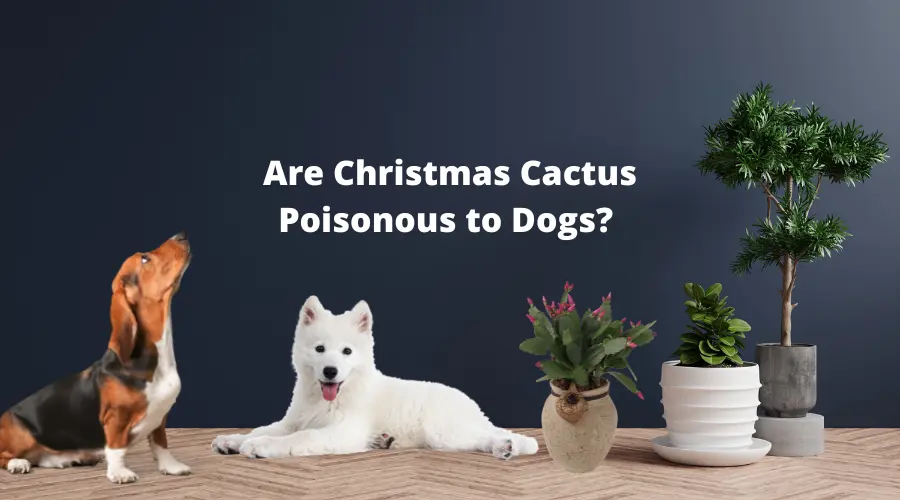So, Are Christmas cacti Poisonous to dogs? The answer is no – Christmas cactus plants are not poisonous to dogs(1). However, there are some potential side effects that you should be aware of if your dog eats a Christmas cactus.
The most common problems are loose stool or an upset stomach caused by ingesting the plant’s leaves or stems. In rare cases, a dog may have an allergic reaction to the Christmas cactus.
If you notice your dog eating a Christmas cactus, or if they seem to be experiencing any adverse effects, contact your veterinarian right away.

Other poisonous holiday plants to dogs include holly, mistletoe, and poinsettias. Hence, be sure to keep these plants out of reach of your furry.
Are Christmas cactus flowers poisonous to dogs?
Christmas Cactus flowers are not poisonous to dogs like the Christmas Cactus plant considering small intake. However, there may be adverse health effects with consumption.
So, it is always advised to prevent your dog from eating any Christmas Cactus flower. In case of any consumption immediately consult a veterinarian and follow their advice for the next steps.
Are Christmas Cactus Leaves poisonous to dogs?
Christmas cactus leaves are generally not poisonous to dogs. However, it may cause an upset stomach and more upon consumption.
So, consult a veterinarian if your dog has eaten even a few leaves of your Christmas Cactus.
Why Do Dogs Eat Christmas Cactus?
Dogs are curious creatures, and they often put their noses where they don’t belong – including into Christmas cactus plants.
While these plants are generally considered non-toxic to dogs, they can cause some gastrointestinal upset if eaten in large quantities.
If your dog does eat a Christmas cactus, watch for signs of an allergic reaction, loose stool, or an upset stomach. If these occur, contact your veterinarian immediately. As with any plant, it is always best to err on caution.
Let’s know more!
How do Christmas Cactus Plants Impact Dogs Health?

While Christmas cactus plants are not poisonous to dogs, they can cause some gastrointestinal upset if eaten in large quantities.
Moreover, the plant’s leaves and stems are covered in tiny spines, irritating a dog’s stomach and causing vomiting or diarrhea. In addition, many Christmas cactus plants are treated with pesticides, which can be harmful if ingested.
Finally, some dogs may have an allergic reaction to the plant, resulting in itching, redness, or swelling.
For instance, if you suspect your dog has eaten a Christmas cactus plant, it is best to contact your vet for guidance.
Loose Stool/Upset Stomach
Loose stool and an upset stomach are common problems in dogs. Several possible causes include dietary indiscretion, stress, allergies, and parasites.
If your dog is experiencing loose stool or vomiting, it’s essential to consult with your veterinarian to rule out any severe underlying conditions. In most cases, however, the problem can be resolved with simple dietary changes or over-the-counter medications.
For dogs with frequent or severe episodes of loose stool, additional measures may be necessary to help maintain a healthy digestive system.
For example, probiotics can help restore the balance of good bacteria in the gut. With proper treatment, most dogs will quickly return to normal digestive health.
Pesticides
Pesticides are a common sight in many household gardens, but did you know that they can harm your furry friends?
Accordingly, dogs and other animals are often attracted to the sweet smell of pesticides, which can be hazardous if ingested.
Christmas cactus is also a common target for pests, and many pesticides contain chemicals that can be harmful if ingested.
As usual, if you suspect your pet has been exposed to pesticides, contact your veterinarian immediately.
Remember, it’s always better to err on caution when it comes to your pets and garden chemicals.
Allergic Reaction
Allergic reactions in dogs can be caused by many different things- from flea bites to grass pollen.
And, as it turns out, Christmas cactus is another potential allergen. Christmas cactus is a member of the cactus family, and like other cacti, it contains small spines or hairs that can irritate a dog’s skin.
In addition, the plant contains a substance called saponin, which is known to cause allergic reactions in some dogs.
In this case, if your dog comes into contact with a Christmas cactus, you may notice him scratching or chewing at his skin or develop a rash. In severe cases, an allergic reaction can lead to difficulty breathing.
What should you do if your dog eats a Christmas cactus?
If your dog eats a Christmas cactus, the first thing you should do is call your veterinarian. While Christmas cacti are not poisonous to dogs, they can cause stomach upset and vomiting.
If your dog has eaten many cactus, he may also experience diarrhea and dehydration. Moreover, your vet will likely recommend giving your dog plenty of fluids and monitoring his stool for signs of blood or mucus.
On the same note, your vet may also prescribe medication to help relieve any intestinal irritation in some cases.
With proper treatment, most dogs recover quickly from eating a Christmas cactus. However, if you notice any persistent or worsening symptoms, contact your vet right away.
What other Holiday plants are poisonous to dogs?
To emphasize, many people are familiar with the dangers of poinsettias, holly, and mistletoe, but several other holiday plants can be poisonous to dogs.
For example, amaryllis and Christmas cactus can cause stomach upset if ingested, while lilies can cause kidney failure in dogs.
In addition, many common houseplants, such as Schefflera and philodendron, can also be harmful to dogs if eaten.
Hence, before you deck the halls this holiday season, be sure to keep these and other potential hazards out of reach of your furry friend.
Conclusion
Let’s conclude the post on whether the Christmas Cactus are poisonous to dogs!
I hope you enjoyed reading this post.

